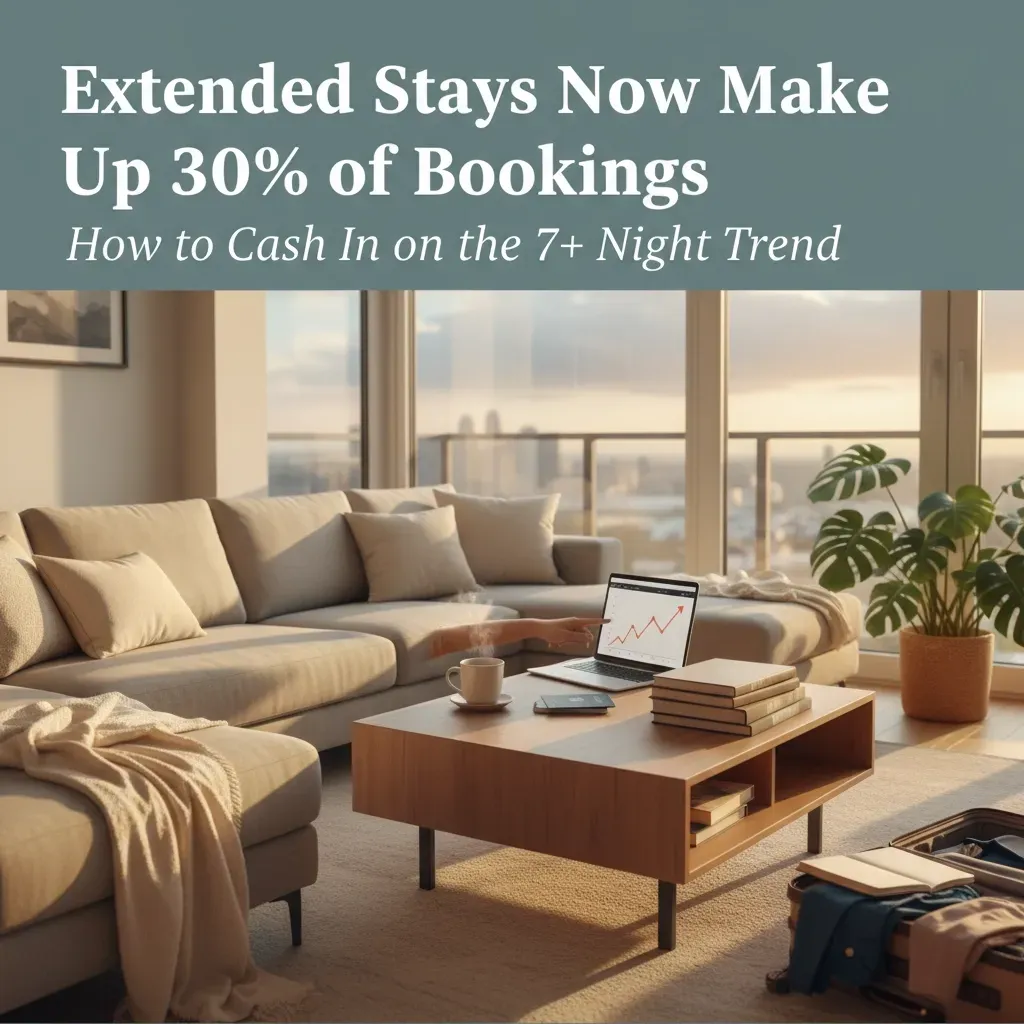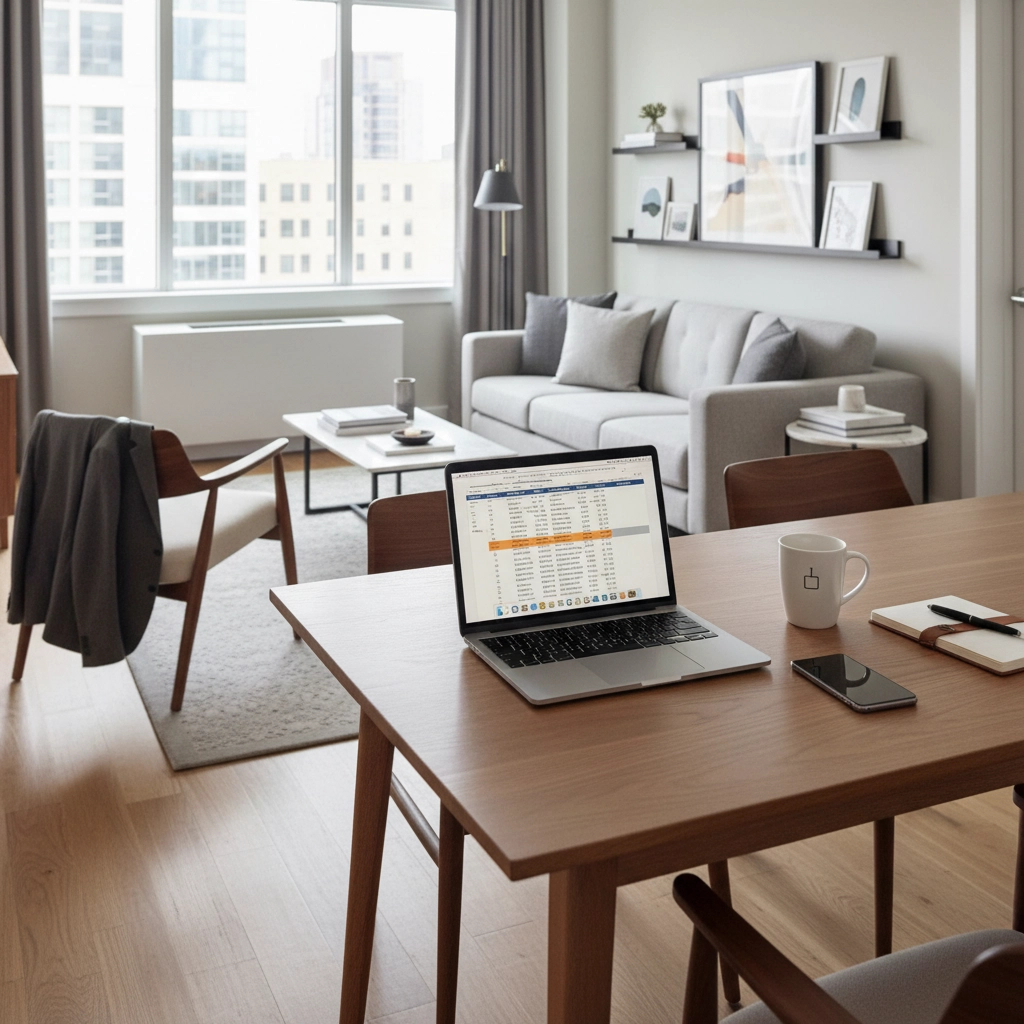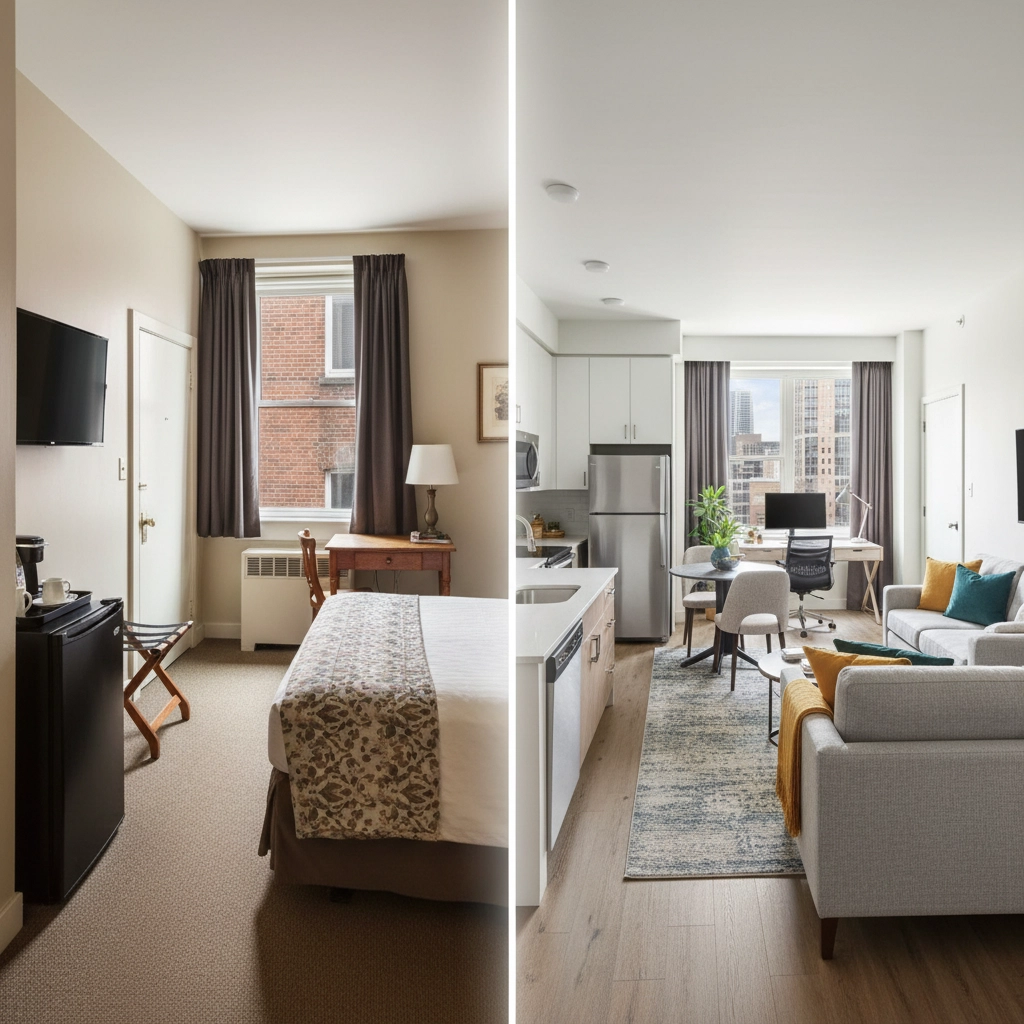
Extended Stays Now Make Up 30% of Bookings: How to Cash In on the 7+ Night Trend
The short-term rental landscape is shifting dramatically, and savvy landlords are taking notice. Extended stays: bookings of seven nights or longer: are becoming the goldmine of the Airbnb world, offering higher profits, lower operational costs, and more predictable income streams than traditional one or two-night bookings.
If you're still stuck in the traditional letting model, you're missing out on a massive opportunity. The data speaks volumes: properties optimized for extended stays are seeing revenue increases of 200-300% compared to traditional six or twelve-month tenancies.
The Numbers Don't Lie: Extended Stays Are Taking Over
The extended accommodation sector has exploded to a staggering $62.8 billion globally in 2025, representing about 7% of the entire travel accommodation market. But here's what's really exciting for UK landlords: 75% of successful short-term rental revenues now come from guests staying seven-plus nights.

This isn't just an American phenomenon. Across the UK, we're seeing business travellers, relocated professionals, and digital nomads driving demand for quality accommodation that bridges the gap between hotels and traditional rentals. These guests want the comfort of home with the flexibility of short-term arrangements: and they're willing to pay premium rates for it.
The operational advantages are game-changing. While traditional hotels need to process numerous daily check-ins and check-outs, properties optimized for extended stays might only see 5-6 new arrivals per week. This translates to dramatically lower cleaning costs, reduced wear and tear, and significantly less administrative overhead.
Why Extended Stays Beat Traditional Letting Every Time
Let's break down the mathematics of why extended stays crush traditional letting models:
Revenue Potential: A well-positioned short-term rental optimized for extended stays can generate 2-3 times the income of a traditional six-month assured shorthold tenancy. Where a traditional rental might bring in £1,200 per month, the same property can easily command £80-120 per night for extended stay bookings.
Occupancy Optimization: Extended stay guests book for 7-30 nights, meaning you're filling larger chunks of your calendar with single bookings. Instead of scrambling to fill 30 individual nights, you might secure your entire month with just 3-4 bookings.
Reduced Turnover Costs: Every guest changeover costs money: cleaning, laundry, restocking amenities, and your time coordinating. With extended stays, these costs are spread across many more nights, improving your profit margins significantly.

Premium Pricing Justification: Guests staying a week or longer are typically business travellers, relocated professionals, or people in transition. They value quality, reliability, and service: and they're accustomed to paying for it. This allows you to command rates that would seem outrageous for overnight stays.
The Corporate Extended Stay Gold Rush
Here's where it gets really interesting: 93% of business-to-business extended stay bookings are for seven nights or longer. Corporate housing has become a massive market as companies realize the cost savings compared to traditional corporate apartments or extended hotel stays.
Companies need accommodation for:
Employees on temporary assignments
New hires relocating to the area
Contractors and consultants on project work
International staff requiring UK accommodation
Teams displaced during office renovations
These corporate bookings often come with higher budgets, longer advance booking windows, and the potential for repeat business. A single corporate client can transform your entire business model.
Maximizing Your Extended Stay Potential
Strategic Property Setup: Extended stay guests have different needs than weekend tourists. They want workspace areas, reliable Wi-Fi, proper kitchen facilities, and comfortable living spaces. Think less "holiday rental" and more "temporary home."
Pricing Strategy Innovation: Successful operators implement tiered pricing that rewards longer stays. You might charge £100/night for 1-6 nights, £85/night for 7-13 nights, £75/night for 14-29 nights, and £65/night for monthly bookings. This pricing structure encourages longer bookings while maintaining profitability.

Amenity Optimization: Stock properties with everything extended stay guests need: quality linens for longer use, proper work lighting, kitchen essentials, and laundry facilities. The initial investment pays dividends through higher guest satisfaction and repeat bookings.
Professional Management Systems: Extended stay properties require different operational approaches. Guest communication becomes ongoing relationship management. Cleaning schedules shift from daily turnovers to weekly maintenance. Property maintenance becomes proactive rather than reactive.
The Technology Advantage
Modern extended stay operations rely heavily on technology to maintain efficiency and profitability. Dynamic pricing tools automatically adjust rates based on local demand, seasonality, and booking patterns. Channel management systems ensure your property appears across multiple booking platforms optimized for different stay lengths.
Guest communication platforms handle the complexity of longer-stay relationships, from pre-arrival briefings to ongoing support throughout their stay. Property management software tracks everything from utility usage to maintenance schedules, ensuring extended stay guests receive consistent service quality.
Direct Booking Optimization: Extended stay guests often prefer booking directly with property managers rather than through third-party platforms. This preference for direct booking: which accounts for 52% of extended stay reservations: means lower commission costs and higher profit margins for operators.
Market Positioning and Growth Strategy
The extended stay market is projected to reach $143.2 billion globally by 2035, growing at 8.6% annually. For UK property owners, this represents an unprecedented opportunity to position properties in a high-growth, high-margin market segment.

Location Strategy: Extended stay properties work best in locations with business districts, universities, hospitals, and major transport links. These locations provide steady demand from business travellers, academic visitors, and people in life transitions.
Portfolio Development: Consider the extended stay potential of your existing properties. A two-bedroom flat near a business district might generate more revenue as extended stay accommodation than a traditional family rental. Properties near universities can command premium rates during academic terms and corporate rates during holidays.
Professional Management: The Game Changer
Managing extended stay properties requires specialized expertise that most landlords simply don't have time to develop. Professional Airbnb management companies handle everything from dynamic pricing optimization to 24/7 guest support, maintenance coordination, and compliance management.
The operational complexity of extended stays: managing longer guest relationships, optimizing for business travellers, handling corporate bookings: requires systems and expertise that individual landlords struggle to maintain while preserving profitability.
Revenue Optimization: Professional managers use sophisticated pricing algorithms that adjust rates based on local events, seasonal demand, and competitor analysis. They understand how to price extended stays to maximize both occupancy and revenue per available night.
Guest Experience Management: Extended stay guests expect higher service levels than typical short-term rental guests. Professional management ensures consistent quality, prompt issue resolution, and the kind of service that generates repeat bookings and positive reviews.
The extended stay trend isn't slowing down: it's accelerating. Properties positioned to capture this market are seeing remarkable returns while traditional rental properties struggle with rent controls, difficult tenants, and limited profit margins.
The question isn't whether extended stays will continue growing: it's whether you'll position your property to capitalize on this goldmine before your competitors do.
